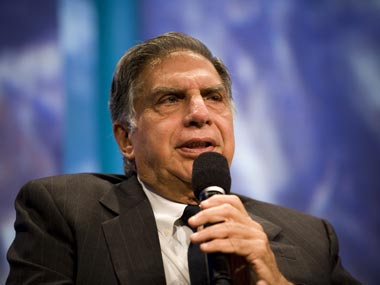The news is plastered right across the top of my morning newspaper, in enormous type usually reserved for natural disasters or election results. The Tatas have finally picked a successor. This is important business news, but is it a matter of urgent national import? Why do we care quite so much?
Ratan Tata has not passed away a la Steve Jobs - whose own retirement didn’t spur this kind of media frenzy. Neither did that of Bill Gates or even Narayana Murthy. Perhaps it’s something about the Tatas, the grande old dames of Indian business, their name tied inextricably to India’s tryst of destiny from that fateful midnight hour in 1947. Or may be it’s a measure of our emotional investment in our business leaders who have emerged as the glittering icons of new India.
Take, for instance, this comment from a Ratan Tata fan on the search for his successor:
Since Tata is not any other business owner in India, each Indian looks at him with a lot of hope of his better future. We trust him because he has proved himself with course of time and so has the bonding strengthened. We purchase his car, we invest in his ventures, we applaud his work, reason we see our blot-free and uncorrupted future in him… I wonder who can take his position plus the responsibility to face trillions with confidence!
The excess of personal sentiment is remarkable. Ratan Tata, for all his achievements, does not have a direct impact on the lives of most Indians - unless you happen to work for the Tatas or own their stock. Nor is he a movie star whose success is predicated on building a direct, intimate relationship with a mass fan base. It’s easier to pretend that you “know” Aamir Khan than Tata. Yet he is no less of a personal hero to the multitude of his middle class fans.
[caption id=“attachment_139405” align=“alignleft” width=“380” caption=“Tatas are the blue-bloods of Indian entrepreneurship, their ranks forever closed to outsiders.Getty Images.”]
 [/caption]
[/caption]
It’s not just the Tatas or select readers of English-language magazines. In his book India Calling, Anand Giridhardas profiles small-town success, Ravindra, son of farm labourers, who now owns his own English language academy and a roller skating rink. What impresses Ravindra most is that Giridhardas met and interviewed Mukesh Ambani. He wants to see every photograph Giridhardas has of Ambani on his laptop.
Impact Shorts
More ShortsA great part of this adulation is explained our unrestrained worship of material success. As a recent Outlook magazine survey reveals, we unabashedly equate money with happiness, and overwhelmingly believe that successful businessmen and industrialists are the happiest of us all. These are our new role models. As Akash Kapur notes ,
The success of these companies has been firmly ensconced in an emerging national mythology. Schoolchildren are brought up on tales of Infosys, India’s best-known software business, founded in 1981 with 10,000 rupees of capital - just $224 at current rates - and worth billions of dollars today. Indian entrepreneurs have entered the pantheon of national heroes.
Not everyone can aspire to become a Bollywood star, but in New India, anyone can dream of being the next Mukesh Ambani, N Narayana Murthy or Nandan Nilekani.
Not, however, a Tata. And that’s where not just Ratan, but all Tatas fall short. They are our capitalist gods, but of the lesser kind. We may admire Ratan’s principles and business acumen, revel in his international clout, but we don’t love him quite as well as his more arriviste peers.
For all the efforts of Ratan Tata to reinvent his empire for the new Indian age of capitalism, his family remains emblematic of an old imperial guard. Even their long record of philanthropy carries to the outsider a hint of aristocratic noblesse oblige. Tatas are the blue-bloods of Indian entrepreneurship, their ranks forever closed to outsiders.
It’s why the Ravindras of this world look not to Tata but to Ambani for inspiration. We will shrug aside Ambani’s crass display of wealth because he is one of us - because it reveals his forgivably nouveau riche roots. But when - in Giridhardas’ colourful words - “Ratan Tata cruises down Marine Drive on Sundays in fast cars and favours Herms ties with matching handkerchiefs” it’s a reminder instead of that country club we will never be invited to join.
This ambivalence was evident today on a number of comment boards , where Mistry’s ascension was greeted with widespread complaints about Parsi parochialism and elitism. Forbes India online director Deepak Ajwani, summed it up in his tweet: “It’s all in the family. The Parsi reign at the Tatas continues.” Yet no one complained when Ambani senior treated his business as a personal legacy to his kids.
We may laud the Tatas for their old-world integrity, but we identify with the Ambanis - and forgive them far more. Or to put it differently, Bollywood will never ever make a biopic about Ratan Tata.
Given the current outrage at crony capitalism and corruption, however, the time of the Ambanis too may have passed. There are early signs of another seismic shift, away from the mindless consumerism and toward a more mindful capitalism. We are no longer content to bask in the reflected glory of the fabulous wealth of our mega-tycoons. We care less about obscene wealth than its social cost - whether to our environment or to democracy. The corporate heroes of this new age are unlikely to be the Ambanis or even the Mistrys, but public-minded businessmen like Azim Premji, Sam Pitrodia, and Narayana Murthy. Or more likely, the many young, dynamic social entrepreneurs who are trying to change our world, one start-up at a time.
The future belongs not to the acquisitive ‘I’ but to the collective ‘We’.
)